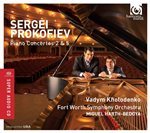|
Back
03/12/2016
Sergei Prokofiev: Piano Concertos N° 2 in G minor, Opus 16 [*], & N° 5 in G major, Opus 55 [**]
Vadym Kholodenko (Piano), Fort Worth Symphony Orchestra, Miguel Harth-Bedoya (Conductor)
Live Recording: Bass Performance Hall, Fort Worth, Texas (October 2014 [*] and March 2015 [**]) – 57’ 03
harmonia mundi #HMU 807631 (SACD) – Booklet in English, French and German

   
This SACD will interest people who have seen the recent film and television documentary, Virtuosity, about the 2013 Van Cliburn International Piano Competition held a few months after the iconic American pianist passed away. The first prize winner, Vadym Kholodenko, is soloist for this disc encompassing two of Prokofiev’s Piano Concertos, both recorded at live concerts with the Fort Worth Symphony and Grammy-nominated maestro Miguel Harth-Bedoya.
Kholodenko is a tremendous pianist in the Russian tradition. Performing on an American Steinway, he gets the kind of rich, non-percussive sonority older listeners will recall from the heyday of Gilels, Richter and Ashkenazy. The disc’s multichannel sound projects superbly, though the instrument has obviously been closely miked. The orchestra also is well recorded, if sometimes a bit boxy; however, this is almost inevitable given the compromises and limits of a live recording.
The Concerto N° 2 has been a standard repertoire for almost a century, though the premiere in 1913 in a suburb of St. Petersburg was booed. It took a few decades for the work to be accepted by performers and audiences alike. Kholodenko brings the right deliberate, thoughtful quality to the first movement’s opening with its sad, not quite mournful theme which the orchestra develops as much as the soloist. The movement climaxes with a long, dense cadenza which occasionally parallels the more weighty one Rachmaninoff wrote for the Piano Concerto N° 3’s first movement, composed just three years earlier. In 1913 Prokofiev was in his early 20s and just beginning to develop his structure and style. The Concerto N° 2 often seems labored, and even in lighter moments of the second movement with its incessant perpetuum mobile, and the third, which sometimes is vaguely playful, the composer almost seems in a rush to get nowhere. He appears uncomfortable with the strictures of symphonic and related sonata form. There is far more whimsy and genuine creativity in his Visions fugitives for piano solo which he wrote just a few years later and some of which last less than one minute.
The Concerto N° 5, written about two decades later, also has structure and mood issues though the use of five comparatively short movements definitely works better, and the third movement, “Toccata”, functions effectively as a cadenza. There is genuine humor in the opening “Allegro” and in the second movement, “Moderato ben accentuate”, is a plodding, robot-worthy march that might work well as music for a new X-Files television episode about alien abduction. The fourth movement, “Larghetto”, is the Concerto’s centerpiece, and it avoids rambling, ending with delicate melodic scales (piano and various orchestra first desk players) toward the conclusion. In the finale “Vivo” quieter sections work best, and, again, Prokofiev uses an array of scales to build to the work’s ultimate climax.
Overall, these are excellent performances of music which can be challenging even a century or so after they were composed and launched. The soloist, Vadym Kholodenko, does a fine job with both works, and this disc will certainly prompt listeners desiring to hear him in further piano repertoire, solo and with orchestra.
Charles Pope Jr.
|